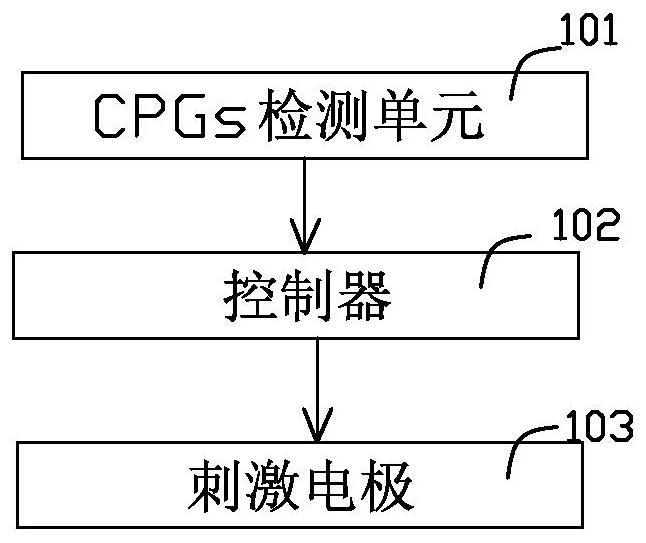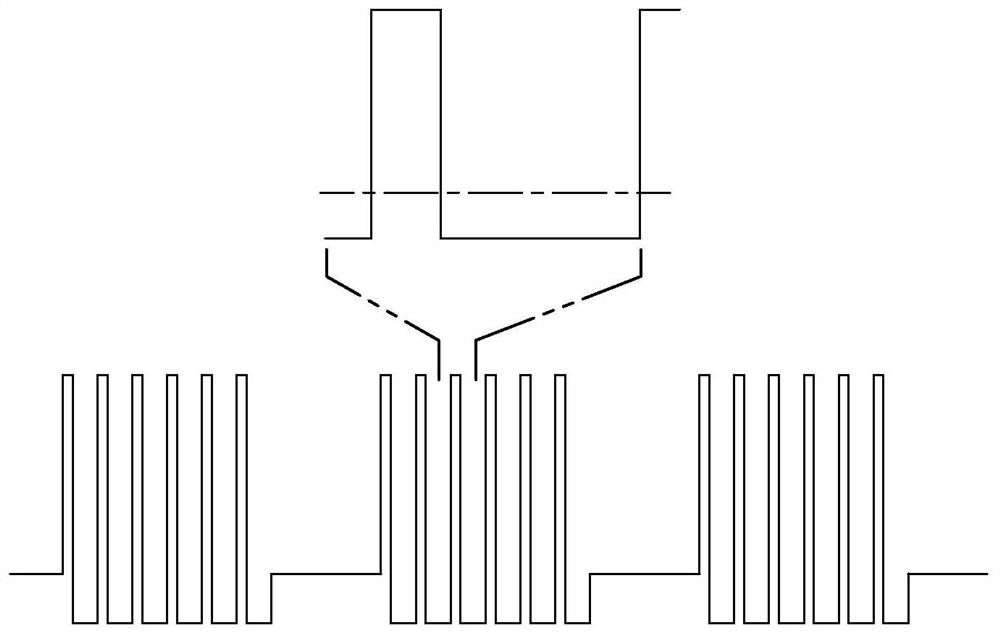A functional transcutaneous electrical nerve stimulation device for motor function regulation
A kinesiology and functional technology, applied in the field of medical devices, can solve the problems of not allowing users to adjust the electrical stimulation protocol, unable to achieve spinal nerve motor stimulation, etc., and achieve the effect of good patient compliance, better effect, and flexible use.
- Summary
- Abstract
- Description
- Claims
- Application Information
AI Technical Summary
Problems solved by technology
Method used
Image
Examples
Embodiment 1-6
[0041] A functional transcutaneous electrical nerve stimulation device for motor function regulation, such as figure 1 and figure 2 As shown, it includes a CPGs detection unit 101, a controller 102 and a stimulating electrode 103;
[0042] The CPGs detection unit 101 is used to monitor the myoelectric signals generated by the CPGs of the lower limbs of the human body, and send a signal generation instruction to the controller 102 after monitoring the myoelectric signals;
[0043] The controller 102 is configured to receive a signal generating instruction, generate a stimulating current according to preset parameters, and input it to the stimulating electrode 103;
[0044] Stimulating electrodes 103 are placed on the skin of the subject's spine for outputting stimulating electric waves;
[0045] The stimulating electric wave is a low-frequency main wave modulated by a high-frequency bidirectional asymmetric square wave as the carrier. The pulse width is inversely proportiona...
Embodiment 7
[0051] Such as image 3 As shown, the difference between the functional transcutaneous electrical nerve stimulation device for motor function regulation and control provided in this embodiment is different from Embodiment 1 in that, further defined, the controller 102 includes a micro-control unit 201, an inverter unit 202, a Voltage unit 203 and current detection unit 206; micro-control unit 201 includes parameter setting module 204, electrical signal generation module 205, current comparison module 207 and current regulation module 208;
[0052] A parameter setting module 204, configured to provide the user with an adjustment sub-module for adjusting parameters, and receive parameters set by the user;
[0053] The electrical signal generating module 205 is configured to receive a signal generating instruction and generate an analog electrical signal according to preset parameters;
[0054] A current detection unit 206, configured to perform AD conversion on the analog elect...
Embodiment 8
[0061] Such as Figure 4-Figure 8 As shown, the functional transcutaneous electrical nerve stimulation device for motor function regulation provided in this embodiment is different from that of Embodiment 7 in that the controller 102 also includes a light sensor connected to the micro-control unit 201 and the booster unit 203 The coupling isolation unit 301 is used to isolate the low voltage control terminal of the microcontroller unit 201 and the high voltage output terminal of the boost unit 203 to ensure the safe operation of the microprocessor control unit 201 . The controller 102 also includes a load protection unit 302 connected to the booster unit 203 and the stimulation electrode 103, used to stabilize the stimulation electrical signal output to the human body and prevent the human body from being harmed by load overcurrent caused by unstable factors or interference.
PUM
 Login to View More
Login to View More Abstract
Description
Claims
Application Information
 Login to View More
Login to View More - R&D
- Intellectual Property
- Life Sciences
- Materials
- Tech Scout
- Unparalleled Data Quality
- Higher Quality Content
- 60% Fewer Hallucinations
Browse by: Latest US Patents, China's latest patents, Technical Efficacy Thesaurus, Application Domain, Technology Topic, Popular Technical Reports.
© 2025 PatSnap. All rights reserved.Legal|Privacy policy|Modern Slavery Act Transparency Statement|Sitemap|About US| Contact US: help@patsnap.com



